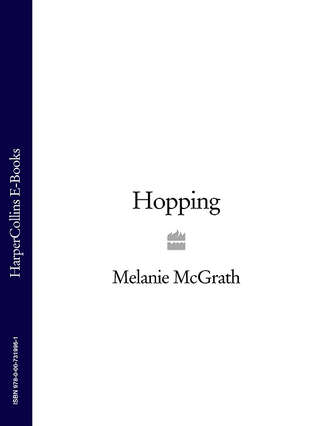
Полная версия
Hopping
The arrival of Daisy, on 17 March 1903, as blue as a monkey’s arse, as Elsie put it, only seemed to remind Elsie of the loss she’d suffered.
The gel’s got her father’s elephant ears and doggy chops, Elsie would announce, cheerfully, to Mrs Shaunessy. Ain’t no one gonna mistake her for no Mona Lisa.
Oh, I don’t know about that, Mrs C, Mrs Shaunessy would reply. That gel of yours is a regular sweetheart. Good as gold, not a mean or nasty hair on her head.
Later, Elsie would complain to Joe about their neighbour.
I ain’t saying she ain’t good to us, Elsie would say, mustering her righteous indignation. But she should mind her p’s and q’s. I ask you, what kind of woman thinks she has the right to tell a mother about her own daughter?
Now, Else, Joe would say, hanging up his jacket and cap and sitting down for his tea, calm down, old gel, there’s plenty worse at sea.
Elsie would slap down her husband’s tea of brawn and boiled greens.
Like you’d know, Joe Crommelin, she’d say. What’s never bleedin’ been at sea but spouts so much sailor talk you’d think he was Sir Walter Bleedin’ Rally. Then she’d turn back to her daughter.
Eat your tea or the Sandeman’ll eat it for you.
The Sandeman lived in The Deep and sometimes spirited naughty children away. Whenever Daisy vexed her mother, Elsie would hold her head in her hands and swear that if Daisy didn’t start being good in short order, the Sandeman would appear and snatch her up and there wouldn’t be a thing Elsie or anyone else would be able to do about it.
When Franny came along, Elsie’s sourness softened, at least for a while. Daisy’s younger sister was a peach, with a head of light brown curls and dimpled little hands. When Elsie took Franny out in her pram, people would stop and coo and say what a darling baby she was and Elsie, endeavouring to look modest, would explain that she’d lost her twinnies and given birth to a plain girl, but Franny was proof that bad luck only ever ran in threes and her arrival had made up, at least in part, for Elsie’s earlier disappointments.
Sensing from early on the power her physical attributes gave her, Franny quickly developed an alarming determination to use them to her advantage. Though neither of her parents seemed to notice, Daisy realised early on that her sister was turning into a canny little manipulator, but in the light she brought with her Daisy could see Franny faintly illuminated a fragile path to Elsie’s heart, and she could not find it in herself to resent her sister. She was everyone’s darling.
Now Daisy walked along Bloomsbury Street in thin rain and stopped at the corner to wait for her best friend, Lilly Seldon. Elsie didn’t approve of the liaison, insisting that Lilly was as rough as pumice, but Elsie was like that about almost everyone Daisy showed an interest in.
Common is as common does, she’d say, but she did not prevent her daughter from seeing her friend. Lilly and Daisy had been friends since their third week at Culloden Street School, when Lilly had backed Daisy into a corner and asked her why her ears stuck out. Later, Lilly said she was sorry about the ears and that she herself had a big nose, and even though she wasn’t a Jew, she had often wondered where that had come from too.
’Ere, Lilly said, a penny says you can’t guess old Peasewell’s nickname. Miss Peasewell was the teacher who daily struggled to inculcate into her pupils a sense of respect for their betters, who numbered almost everyone.
I don’t know: Pease Puddin’? Daisy ventured, conscious that her future in some way depended on the answer.
Pease Puddin’? Lilly snorted. Pease Puddin’? What a doze you are. Pease Puddin’ ain’t a name.
Daisy shrugged and said she couldn’t think of any other name.
Pigswill, silly, said Lilly, landing a friendly punch on Daisy’s arm. Old Piggy Pigswill, ha ha ha. Then she looked up at Daisy and saw those ears and relented. I suppose Pease Puddin’ ain’t so bad, though, she said.
And after that, the two girls became the best of friends.
Four years of education had not served Daisy well and she often relied on Lilly to dig her out of the holes in her learning. She could read and write well enough to check a pawn ticket, though, or decipher the numbers on the tallyman’s chit, and she knew just by looking at the coins in her hand whether or not a trader had short-changed her; already she sensed that these skills were likely to be most of what she needed to reach the low horizons mapped out for girls like her. She would stay on at school until she reached twelve and join the half-and-half system, spending half her time at school and the other half working in a factory. A year or two later, if she was diligent and lucky, the factory might take her on full-time, or she might find work sewing collars and cuffs or wrapping bars of soap. If not, she would become one of the 30 per cent of working women who were forced to leave their homes and families and find work as domestic servants. She’d heard enough about life as a domestic from her mother to find the prospect terrifying: the slavish hours, the removal from family and friends and the complete dependence on the whims of strangers. She knew she wasn’t sharp like Lilly, but what she lacked in brains she determined to make up for in diligence. One day, she hoped Keiler’s or Peek Freans or some other factory would see how hard she applied herself and want to take her on.
At midday, she packed her slate and headed back home for her lunch. A warm, fatty smell greeted her at the door of number 7. Elsie was in the scullery shuffling the piles of drying laundry she had been washing all morning. It was no longer raining and Franny was shut outside in the yard with the dog. Elsie opened the door and called her in, then, making a space at the table, she slopped down two bowls of bacon barley soup and, announcing she had a bonce ache so bad it felt like a horse had kicked her in the head, went to lie down for a while.
Whenever the family needed a bit more money than usual, Elsie would keep Daisy back from school in the afternoons to help her with her flower-making. From one o’clock to six o’clock they would sit on the floor in the scullery, twisting and wiring and stringing, starching and curling, delicately painting spots and shadings on scraps of silk until what had been nothing more than a pile of brightly coloured fragments had been transformed into the silk irises, forget-me-nots, violets and roses that would adorn the hats of women and girls more fortunate than themselves. While they worked, Franny would be dispatched to Mrs Shaunessy, or sent to play in the yard, or, if the weather was bad and Mrs Shaunessy wasn’t in, locked in her room to prevent her from messing up the scraps of silk and delicate fixings.
It was piecework and poorly paid; on cold and damp days Elsie would complain that her finger joints knitted together and on warmer days the silk dust scratched at both their lungs and brought on bronchitis. By the end of the afternoon, their eyes were often so irritated by glue and fibres that they swelled and oozed with yellowish fluid. But there were worse jobs for the homeworker, like making matchboxes or stitching newly tanned leather for shoe soles, and, as Elsie liked to remind Daisy, there were plenty of women and children down in The Deep who were at that very moment busy doing them.
On weekday evenings, after work or school, Elsie expected Daisy to play outdoors, and she and Lilly would pass the time spinning tops, or playing pat-a-cake or skipping games, or they would simply walk about the streets of Poplar, hanging off the street lamps and gazing in the windows of the shops. In winter, Mrs Shaunessy would sometimes take pity on them and let them warm themselves at her fire and give them a slice of parkin or a rock bun.
The one exception to this was Friday afternoon, when Daisy was expected carefully to wrap the week’s flowers in tissues, arrange them in a series of old cigar boxes and place them inside a tea chest on to which Joe had grafted some old pram wheels, then help her mother push the chest three miles west along the Commercial Road to Leitkov’s millinery in Aldgate, where they would collect their payment for the week’s work and pick up a new allocation of silk scraps, ribbons, wire, beads and paints. These Elsie stored in a large keel-shaped basket woven from Kentish willow which she kept beside the fireplace to keep the silk from getting damp.
You ever touch this basket without my say-so, Elsie would warn her daughters, and the Sandeman will carry you off to the orphanage so fast you won’t know what’s hit you.
So they never did.
Daisy always looked forward to Friday evenings, when Joe would often bring them some treat he’d lifted from his lighter cargo – a few locust beans or carob pods, some liquorice twigs, a handful of monkey nuts or even a crab or two. While he ate his tea, he would regale his daughters with all that had happened to him that week on the river. Sometimes the tar boats caught fire and the whole of the river would become a wall of blue and orange flame or the water would freeze into a slush littered with icy diamonds. Other times, great fish would rise from the water and tell stories about all the drowned sailors who lived in huge cities at the bottom of the sea, or Joe would uncover a smugglers’ den or spot a mermaid stranded by the tide.
Saturday mornings were taken up with chores, but on Saturday afternoons Joe would take his girls to the Sally Army concerts in Tunnel Park and afterwards treat them to a piece of cold fried fish or a little waxed cone full of whelks and a jam jar of lemonade. On Sundays Elsie would boil up a sheep or pig head. On special occasions she would take a piece of gammon ham or a pork leg to the bakers to roast and follow it with a steamed syrup pudding or a spotted dick. Sunday nights were lived in dread of Elsie’s Monday feints and tantrums.
Today was no exception. If anything, Elsie had been even more grumpy than was usual on a Monday. The Friday before, Leitkov had given Elsie and Daisy twice the usual amount of silk and ribbon and finishings so they might complete enough flowers for the Christmas rush, and Daisy and her mother had worked late on Friday night, then again on Saturday and Sunday, but by Monday morning they had made barely a dent in the piles of scraps and pieces of ribbon in the willow basket, and Elsie decided to keep her eldest back from school in the afternoons so they could get the job done. Now she was ill with one of her innumerable, vague complaints, and Daisy was left trying to get through the task alone.
At five, Elsie rose from her bed in a fluster, glanced at the mantelpiece clock, started muttering to herself about the time and getting Joe’s tea, then, throwing on her coat, announced she was going to fetch a piece of pork belly or maybe a spot of jellied trotter, leaving Daisy with instructions to begin boxing up the flowers and to make sure Franny remained in her room until they were all safely packed away. In recognition of her daughter’s efforts she put a halfpenny in Daisy’s hand, telling her to spend it on muffins or a toffee apple from one of the vendors who paraded their wares around the streets on open trays, accumulating smuts and factory fumes.
Now you be careful while I’m gone. The Sandeman’s watching and don’t you forget it.
Daisy began gathering up the flowers and scraps of unused silk, but within minutes of her mother’s departure, she heard Franny crying and begging to be released from her room. For a while Daisy ignored her, but, eventually, her heart pricked, she climbed the flimsy staircase and opened the bedroom door, thinking she would set her little sister in the yard to play with the dog. When they reached the back door they saw that a greenish fog had come down and Franny shook her curls and screwed her delicate little face into a fist, and Daisy, who could never bring herself to do anything that made her sister unhappy, sat her at the table and told her to sit as still as the clock on the mantelshelf and touch nothing.
No harm might have come of this minor infraction of the rules had the toffee apple man not turned into Bloomsbury Street at precisely that moment, crying:
Apples and flats, apples and flats!
Flats, the discs of toffee that pooled from the toffee apples when they were left to set, were the two girls’ favourite treat, and it was so rare for them to have any money with which to buy anything, that Daisy could not resist the impulse to go out into the street and get some.
Don’t touch nothing. I’ll only be a minute.
Despite the weather, a line of wide-eyed children had already formed around the toffee apple man’s tray and it took Daisy a while to push through the crowd, claim her prize and hurry back to the house. When she did, she realised immediately the mistake she had made in leaving her little sister alone. The scullery looked as though a high wind had passed through it. Silk scraps lay scattered across the lino flooring and between the scraps broken flowers lay, their petals wrenched out or torn or bent at strange angles. There was ribbon strewn across the table, torn and knotted in places. The air was dense with fibres and silk dust and the sheets and pillowcases that had been hanging on string lines beside the fire were spotted all over with little pieces of silk, whose bright colours were already creeping their way across the whiteness of the cotton. And there was Franny sitting in the midst of it with her hands in the basket.
Oh, my knees and knuckles, Daisy said, Franny Crommelin, what have you done?
You said sit still as the clock, Franny cried in a voice ripe with indignation, but the clock moved! Daisy glanced towards the mantelpiece, where the clock was still in the place it had always been, its spot marked out on the mantel in dust and smuts from the fire. But ten minutes had passed and the hands of the clock had indeed moved.
I want the flowers! Franny screamed. You always have the flowers.
Suddenly, Daisy understood why her sister had done what she had. Franny had torn up the silk because she didn’t want Daisy to have anything she didn’t have, and because she knew she could. Already so sure of her power over the family, Franny knew that, whatever she did, her older sister would somehow always shoulder the blame. The thought of it was unbearable to Daisy, yet at the same time she knew it was true.
This time she had gone too far. Half lifting, half dragging, Daisy forced her sister through the scullery, and pushing her out into the yard. As she stumbled on to the flags, Franny uttered a low growl, the sound, Daisy remembered later, of a cornered cat, full of defiance and contempt. She shut the back door behind her, turned the key in the lock and leaned on it, trying to catch her breath. After all she’d been to her little sister, it hadn’t been enough. Franny resented her, hated her even, and wanted her to fail. She began scurrying about, picking up silk scraps, pressing them back into shape with her hands, scooping up the pieces of feather and red and green ribbon, trying to salvage what she could from the mess, but pretty soon Franny began a piteous wailing in the yard, and all the love and protectiveness Daisy felt for her little sister flooded back and she felt disabled and ashamed. Opening the door, she said:
All right, all right, there, there.
You said to stay still as the clock, Franny said sulkily. You said it, but the clock moved.
Daisy nodded. Franny was right. What had happened was her fault. It was all her fault. She returned to the clearing up. It very soon became clear that most of the flowers, the silk scraps and ribbon were ruined and the laundry was dotted about with blooms of transferred dye. Daisy dreaded her mother’s return.
When Elsie saw the mess she screamed so loudly that Mrs Shaunessy came rushing round, thinking she was being attacked, and after she left, Elsie pounded and thumped Daisy so hard that her breath came in rasps as if from an old kettle.
I wish the Sandeman would come and take yer. I wish he would, Elsie raged. ’Cause you ain’t no good to me, yer blue-arsed little weakling with yer elephant ears. I wish you’d never been born. I wish the Sandeman would take yer right now so that I wouldn’t ever have to trouble me eyes with you again.
As she swore and rampaged about, Franny sat at the table, perfectly still, with a little smile playing on her face.
What Daisy did not know and could not know then was how far and with what shocking speed this event would tumble into another, and another and another, until only the thinnest barrier, as fragile as eggshell, separated the Crommelin household from catastrophe. She did not know this because she did not consider her family to be poor – hadn’t Elsie always said they were respectable? – and because she had no notion yet of how vulnerable they were, and because she had not been alive long enough to understand the relentless cruelty of the East End tides, which daily washed in the hopeful and the desperate and daily dashed their hopes. She did not know, yet, what Joe Crommelin knew and had not thought to tell her, because she was not a boy, that to survive you had to steer your course mid-stream, where the water was deepest and ran fastest, that you had to paddle fast, as fast as you could, to stay there, to stay still in the rushing current, because the price of failure was to be washed up on the beach or be dashed to pieces on the wharves.
On Friday, Daisy walked alone to Leitkov’s, but instead of the usual boxes of jaunty irises and delicate roses, she carried the Kentish willow basket with what remained of the scraps. Listening to her story, the milliner sat impassively for a while, then reached for his account book and started totting up figures in his head. Eventually he said:
Tell your mother she owes me eight shillings and sixpence and there’ll be no more work till she’s paid it. I’ll be sending my man around every Friday to collect two and six. Tell her that.
Daisy returned home with the news. She sensed that, from now on, Friday evenings would never be the same.
For a while, Elsie struggled to pay back the money she owed Leitkov. She took in more laundry and kept Daisy back from school to help her with it and for days together the scullery reeked of carbolic and borax and Mrs Anderson complained that the plashing sound of the dolly peg and the rhythmic scraping of the washboard disturbed her sleep, but they never seemed to be able to make enough to pay off the collector when he came on a Friday. The experience seemed at once both to harden Daisy’s mother and render her more fragile, as though she’d been fired in a kiln at the wrong temperature. Elsie began to look around for things to hock. The first thing to go was the mantelpiece clock, then after that the china Elsie had been given as a wedding present by the woman in whose house she had worked as a maid. Next was Elsie’s overcoat, then Daisy’s, followed by some bed blankets. On Monday mornings it was now Daisy’s job to fill the cart that had once contained silk flowers with blankets and coats and set off for the pawnbroker, and as she walked by Helen Reid with her half-caste son, past the Greenbergs, it seemed that all that lay between them and The Deep were a few front doors.
Not long into the New Year, Elsie stopped eating, and at the same time she took up cleaning and polishing and scrubbing and bleaching and sweeping with more vigour than ever, and often at the oddest times. It was nothing to find her whitening the step at six in the morning, or hunched over her scrubbing brush in the middle of the night. When he got home from work in the evenings, Joe tried to comfort her, but she beat him off with her fists, and told him he could bugger off and take his bloody children with him. He began to spend more and more time in the pub after that.
The spring of 1914 arrived and patriotic flags began to appear in the shops. In May 1914 Joe came home with the news that the dockers had refused to handle German cargo and Mrs Shaunessy reported that Burrelli’s paint factory, where Mr Shaunessy worked, had dismissed all its German workers. By early summer, the more usual advertisements for flu powders and meat tea pasted on to Poplar’s billboards began to be replaced by recruitment posters and men in uniform were seen outside the East End’s pubs and cafés. Billy Shaunessy started catapulting boys and girls in the street and shouting:
Halt, friend or foe?
By late summer, columns of men had begun marching up and down the East India Dock Road most days, and queues of men gathered at the recruiting station in Poplar High Street, waiting to volunteer for the standard six-month tour of duty which was how long everyone was saying it would take to defeat the Hun. It was said that one fifth of those signing up were of German descent, keen to prove their patriotism or maybe to save their skins, for German butchers were having their windows smashed and anyone with a German name was in danger not just of losing his job but of being set upon in the street. At Culloden Street School Old Pigswill introduced an air-raid drill and taught potted histories of the calumnies of the Boche. In early September a sign went up at the general store around the corner offering credit for volunteer families only. The following day a great oval-shaped cloud floated across Poplar and in class Old Pigswill explained that airships would help defeat the enemy. Later that week a policeman rode by on a bicycle shouting Take cover! and sirens sounded and Daisy returned home at lunchtime to find her mother locked in the understairs cupboard shouting Give me back my twinnies! with Mrs Anderson rapping on the cupboard door and threatening to fetch Joe and the police and the doctor all at once. That night Daisy heard Joe and Mrs Shaunessy talking about her mother in hushed tones, Mrs Shaunessy every now and then clicking her tongue against her teeth, as though she were measuring the march of the Sandeman, advancing toward them.
Later that week Daisy returned home from school to find Mrs Anderson cooking faggots in the scullery.
Your mother’s gone for a little rest, poor duck, said Mrs Anderson. But never you worry, Mrs Shaunessy’s going to be taking you and yer sister on a nice long trip to the countryside.
CHAPTER 2
Mrs Shaunessy trudged forward in the gloom before dawn, trundling her hop box on a borrowed barrow. For the past three months she’d been stashing away the odd jar of Bovril, a sugar cube or two and a few packets of flour in the box that Paddy Shaunessy had fashioned from an old tea chest, and the night before she’d filled it with a bucket, a tea towel, a scrubbing brush and other domestic paraphernalia. Behind her Daisy pushed a pram containing Franny, who, at four, was far too big for the lacy bonnet Mrs Shaunessy had insisted that she wear as a kind of disguise (for what purpose she would discover later), and a half-dozen tins of corned beef. Billy Shaunessy trailed behind with a Union Jack sticking out of his pocket. Ever since Mr Shaunessy had signed up, Mrs Shaunessy considered it a matter of filial duty that Billy demonstrate the family’s patriotism at every opportunity, and the flag was intended for this purpose. Whenever men in uniform passed, heading towards the docks, Mrs Shaunessy would turn her head and say:
Wave that flag, Billy! And give our men a cheer!
And, scowling, Billy would jab the flag in the air and issue a half-hearted hoorah. As they neared London Bridge the number of soldiers increased, and by the time they reached the bridge itself poor Billy was jabbing and cheering like a mad thing. Mrs Shaunessy strode on ahead across the bridge, singing ‘Onward, Christian Soldiers!’






